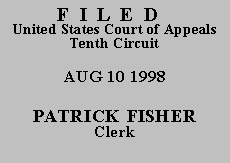

| UNITED STATES OF AMERICA,
Plaintiff-Appellee, |
No. 97-6354
(D.C. Nos. 95-CR-167-R
& 97-CIV-1208-R |
In United States v. Simmonds, 111 F.3d 737, 746 (10th Cir. 1997), this court held that a defendant whose conviction became final before the effective date of the Antiterrorism and Effective Death Penalty Act, i.e., before April 24, 1996, had until April 23, 1997, to file a motion under 28 U.S.C. § 2255. The defendant's conviction became final on April 3, 1996, and as a result, he had until April 23, 1997, to file his § 2255 motion. See Simmonds, 111 F.3d at 746. The defendant failed to meet this deadline, and as a result, we can see no justification for granting the requested certificate of appealability under 28 U.S.C. § 2253.
Additionally, in light of the fact that the appellant has paid his appellate filing fee, his motion to proceed in forma pauperis is moot.
For the foregoing reasons, we DENY the appellant's motion to proceed in forma pauperis; we DENY the appellant's petition for a certificate of appealability, and we DISMISS this appeal.
The mandate shall issue forthwith.
ENTERED FOR THE COURT
David M. Ebel
Circuit Judge
*.After examining appellant's brief and the appellate record, this panel has determined unanimously that oral argument would not materially assist the determination of this appeal. See Fed. R. App. P. 34(f) and 10th Cir. R. 34.1.9. The case is therefore ordered submitted without oral argument. This Order and Judgment is not binding precedent, except under the doctrines of law of the case, res judicata, and collateral estoppel. The court generally disfavors the citation of orders and judgments; nevertheless, an order and judgment may be cited under the terms and conditions of 10th Cir. R. 36.3.